|
| |
SECOND ANNUAL IAAC LITERARY FESTIVAL
in collaboration with The English Department, Hunter College (West Building) at 68th Street and Lexington Avenue
OCTOBER 22-25, 2015 |
| October 24th, 2015 - 3:30 – 4:30 pm |
Session 4B
India and her Realities
Authors: Raghu Karnad, Meera Subramanian
Moderator/Author: Hindol Sengupta
 |
| |
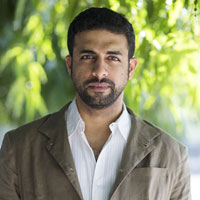 Raghu Karnad is an Indian journalist and editor, and the author of Farthest Field: An Indian Story of the Second World War. He has worked at two national newsweeklies, Outlook and Tehelka, writing articles that won prizes including the European Commission’s Lorenzo Natali Award, the Every Human Has Rights Award, and the Press Institute of India Prize for Reporting on Conflict. Between 2009 and 2011, he was editor of Time Out Delhi. He has also been published in Granta, the Financial Times in London, the journal n+1 in New York, and the Caravan in New Delhi. His essay on uncovering WW2 in India's north-east won a prize in the inaugural FT-Bodley Head international essay competition in 2012. Raghu Karnad is an Indian journalist and editor, and the author of Farthest Field: An Indian Story of the Second World War. He has worked at two national newsweeklies, Outlook and Tehelka, writing articles that won prizes including the European Commission’s Lorenzo Natali Award, the Every Human Has Rights Award, and the Press Institute of India Prize for Reporting on Conflict. Between 2009 and 2011, he was editor of Time Out Delhi. He has also been published in Granta, the Financial Times in London, the journal n+1 in New York, and the Caravan in New Delhi. His essay on uncovering WW2 in India's north-east won a prize in the inaugural FT-Bodley Head international essay competition in 2012. |
| |
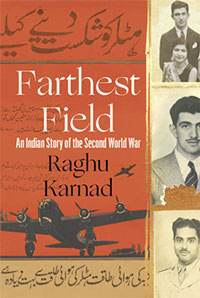 Farthest Field: An Indian Story of the Second World War - India’s extraordinary role in the Second World War has been concealed, from itself and from the world. In riveting prose, Karnad retrieves the story of a single family - a story of love, rebellion, loyalty and uncertainty - and with it, the revelation that is India’s WW2. Farthest Field narrates the lost epic of India's war, in which the largest volunteer army in history (2.5m men) fought for the British Empire, even as its countrymen fought to be free of it. It carries us from Madras to Peshawar, Egypt to Burma - unfolding the saga of a young family amazed by their swiftly changing world and swept up in its violence. In reviews in the UK papers, Farthest Field has been described as 'a masterpiece' (Simon Winchester, in the New Statesman), 'a bravura feat of literary-historical imagination' (Neel Mukherjee, in the FT), written 'with the imaginative gift of a first-rate novelist' (Juliet Nicolson, in the Daily Telegraph). Farthest Field: An Indian Story of the Second World War - India’s extraordinary role in the Second World War has been concealed, from itself and from the world. In riveting prose, Karnad retrieves the story of a single family - a story of love, rebellion, loyalty and uncertainty - and with it, the revelation that is India’s WW2. Farthest Field narrates the lost epic of India's war, in which the largest volunteer army in history (2.5m men) fought for the British Empire, even as its countrymen fought to be free of it. It carries us from Madras to Peshawar, Egypt to Burma - unfolding the saga of a young family amazed by their swiftly changing world and swept up in its violence. In reviews in the UK papers, Farthest Field has been described as 'a masterpiece' (Simon Winchester, in the New Statesman), 'a bravura feat of literary-historical imagination' (Neel Mukherjee, in the FT), written 'with the imaginative gift of a first-rate novelist' (Juliet Nicolson, in the Daily Telegraph). |
| |
|
| |
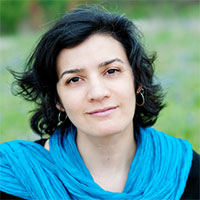 Meera Subramanian is an award-winning journalist whose work has been published in the New York Times, Wall Street Journal, Nature, Salon, USA Today, Dissent, Discover, Audubon, Smithsonian, Virginia Quarterly Review, Bidoun, Grist, as well as internationally in Caravan, Open, India Today, and Geo in India and in France, Russia, South Africa and Italy. Her long-form feature, “India’s Vanishing Vultures,” published in the Virginia Quarterly Review in 2011, received numerous accolades including the Staige D. Blackford Prize for Nonfiction and first place for outstanding feature story from the Society of Environmental Journalists 11th Annual Awards for Reporting on the Environment. She is an editor for Killing the Buddha, an online literary magazine about religion, culture, and politics, and her essays have been anthologized Best American Science and Nature Writing, Believer, Beware: First-Person Dispatches from the Margins of Faith (Beacon Press, 2009) and multiple editions of The Best Women’s Travel Writing (Travelers’ Tales, 2011, 2012, 2013). Meera received a Fulbright-Nehru Senior Research Fellowship for her work on A River Runs Again. Meera Subramanian is an award-winning journalist whose work has been published in the New York Times, Wall Street Journal, Nature, Salon, USA Today, Dissent, Discover, Audubon, Smithsonian, Virginia Quarterly Review, Bidoun, Grist, as well as internationally in Caravan, Open, India Today, and Geo in India and in France, Russia, South Africa and Italy. Her long-form feature, “India’s Vanishing Vultures,” published in the Virginia Quarterly Review in 2011, received numerous accolades including the Staige D. Blackford Prize for Nonfiction and first place for outstanding feature story from the Society of Environmental Journalists 11th Annual Awards for Reporting on the Environment. She is an editor for Killing the Buddha, an online literary magazine about religion, culture, and politics, and her essays have been anthologized Best American Science and Nature Writing, Believer, Beware: First-Person Dispatches from the Margins of Faith (Beacon Press, 2009) and multiple editions of The Best Women’s Travel Writing (Travelers’ Tales, 2011, 2012, 2013). Meera received a Fulbright-Nehru Senior Research Fellowship for her work on A River Runs Again. |
| |
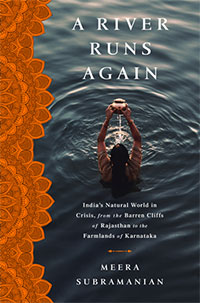 A River Runs Again - Crowded, hot, subject to violent swings in climate, with a government unable or unwilling to face the most vital challenges, the rich and poor increasingly living in worlds apart; for most of the world, this picture is of a possible future. For India, it is the very real present. In this lyrical exploration of life, loss, and survival, Meera Subramanian travels in search of the ordinary people and microenterprises determined to revive India’s ravaged natural world: an engineer-turned-farmer brings organic food to Indian plates; villagers resuscitate a river run dry; cook stove designers persist on the quest for a smokeless fire; biologists bring vultures back from the brink of extinction; and in Bihar, one of India’s most impoverished states, a bold young woman teaches adolescents the fundamentals of sexual health. While investigating these five environmental challenges, Subramanian discovers the stories that renew hope for a nation with the potential to lead India and the planet into a sustainable and prosperous future. A River Runs Again - Crowded, hot, subject to violent swings in climate, with a government unable or unwilling to face the most vital challenges, the rich and poor increasingly living in worlds apart; for most of the world, this picture is of a possible future. For India, it is the very real present. In this lyrical exploration of life, loss, and survival, Meera Subramanian travels in search of the ordinary people and microenterprises determined to revive India’s ravaged natural world: an engineer-turned-farmer brings organic food to Indian plates; villagers resuscitate a river run dry; cook stove designers persist on the quest for a smokeless fire; biologists bring vultures back from the brink of extinction; and in Bihar, one of India’s most impoverished states, a bold young woman teaches adolescents the fundamentals of sexual health. While investigating these five environmental challenges, Subramanian discovers the stories that renew hope for a nation with the potential to lead India and the planet into a sustainable and prosperous future. |
| |
|
| |
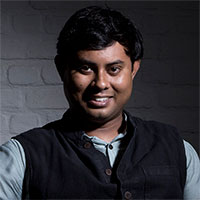 Hindol Sengupta is the author of six books including Recasting India: How Entrepreneurship is Revolutionizing the World's Largest Democracy (Palgrave Macmillan, Fall 2014) which is the only Indian book ever to be shortlisted for the Hayek Prize given by the Manhattan Institute for original writing in economics in memory of the Nobel laureate F A Hayek. His next book Being Hindu is being released by Penguin Random House in Fall 2015. He is Editor-at-Large for Fortune India and founder of the Whypoll Trust which worked on India's first women safety mobile app and gender mapping of Delhi. He was invited to present his research on Hinduism and technology at the XXI World Congress of the International Association for the History of Religion. He is the co-founder of the South Asia Media Project incubated in Lund University, Sweden and an alumni of the Australia-India Youth Dialogue. He is a TEDx speaker, and spoken at the Manthan Samvaad, India's annual TED-like event. Hindol Sengupta is the author of six books including Recasting India: How Entrepreneurship is Revolutionizing the World's Largest Democracy (Palgrave Macmillan, Fall 2014) which is the only Indian book ever to be shortlisted for the Hayek Prize given by the Manhattan Institute for original writing in economics in memory of the Nobel laureate F A Hayek. His next book Being Hindu is being released by Penguin Random House in Fall 2015. He is Editor-at-Large for Fortune India and founder of the Whypoll Trust which worked on India's first women safety mobile app and gender mapping of Delhi. He was invited to present his research on Hinduism and technology at the XXI World Congress of the International Association for the History of Religion. He is the co-founder of the South Asia Media Project incubated in Lund University, Sweden and an alumni of the Australia-India Youth Dialogue. He is a TEDx speaker, and spoken at the Manthan Samvaad, India's annual TED-like event. |
| |
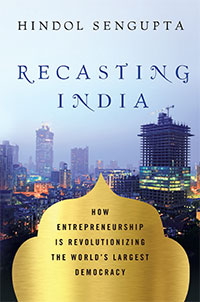 Recasting India - More than two decades after India opened its economy, it still struggles with staggering levels of inequality. A third of its citizens still lack adequate food, education, and basic medical services, while Reliance Industries chairman Mukesh Ambani lives in a home in Mumbai that is rumoured to be the most expensive in the world and cost nearly a billion dollars. India has launched a mission to Mars, yet there are still more mobile phones than toilets in the country. Anywhere else, the locals would be pounding at the billionaires’ gates. So why no Arab Spring for India? Recasting India - More than two decades after India opened its economy, it still struggles with staggering levels of inequality. A third of its citizens still lack adequate food, education, and basic medical services, while Reliance Industries chairman Mukesh Ambani lives in a home in Mumbai that is rumoured to be the most expensive in the world and cost nearly a billion dollars. India has launched a mission to Mars, yet there are still more mobile phones than toilets in the country. Anywhere else, the locals would be pounding at the billionaires’ gates. So why no Arab Spring for India?
Hindol Sengupta argues that the only thing heading off civil war is the explosion of local entrepreneurship across the country. In Recasting India, he introduces us to a colorful cast of entrepreneurs selling everything from low cost sanitary napkins to call centre services in villages to mobile phone based ‘Facebook and Google for the poor’ – and tackling the country’s vast social problems at the same time. |
| |
|
| |
| |
|
|

